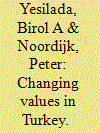| Srl | Item |
| 1 |
ID:
095676


|
|
|
|
|
| Publication |
2010.
|
| Summary/Abstract |
Using data from the World Values Surveys, this study examines changing values in Turkey and shows that rising religiosity and intolerance can be traced back to 1995 and have become more visible during the AKP's rule. Moreover, Turks are found to be the most religious of all the societies compared in the study. Findings suggest that Turkish voters are likely to continue being attracted to political parties like the AKP in the future, which would have important implications for Turkey's relations with its traditional friends in the West.
|
|
|
|
|
|
|
|
|
|
|
|
|
|
|
|
| 2 |
ID:
076769


|
|
|
|
|
| Publication |
2006.
|
| Summary/Abstract |
This essay analyzes the regional and global implications of different enlargement formulations of the European Union (EU) during the first half of the twenty-first century by (1) assessing the consequences of expanded EU membership with varying enlargement scenarios regarding global power distributions, (2) considering the implications of a drift between the United States and the EU as China reaches parity with the West, and (3) examining the implications of EU enlargement for regional stability in the Middle East as a consequence of Turkey's entry into or rejection by the EU. The findings reaffirm earlier results that China is expected to reach parity with the United States in 2025-2030 and move ahead to be the largest economy in the world. The results for the EU show that, regardless of its enlargement plans, it will fall behind the other giants, becoming the third largest economy. Part of the expected decline in its GDP share can be offset by adding Turkey, and perhaps Russia, to the Union. We also find that Turkey's inclusion into the EU will bring stability to the Middle East. Moreover, we observe that the relationship between Iran and Turkey is one with a high probability of conflict and that it will intensify very quickly over time. With Iran's pursuit of nuclear weapons, this dyad is likely to become more conflictual before Iran establishes clear superiority. Turkey's membership in the EU would remove Iran's growing challenge to the volatile Middle East. With Turkey in the EU, parity between Iran and Turkey would disappear and Iran could no longer project hostility against the latter.
|
|
|
|
|
|
|
|
|
|
|
|
|
|
|
|